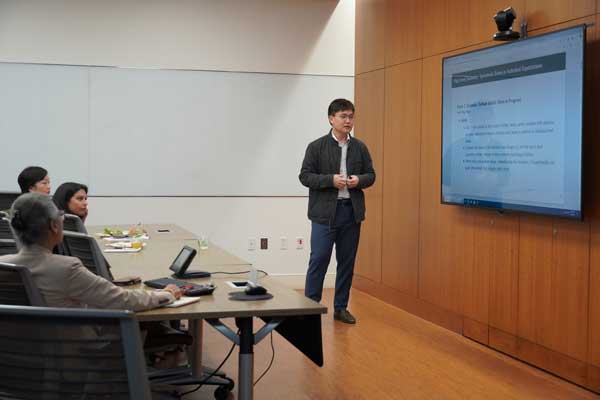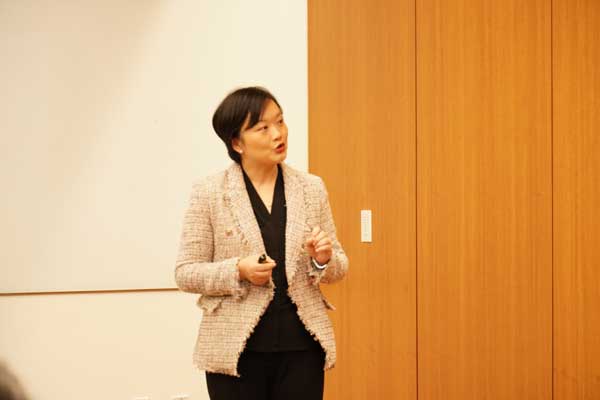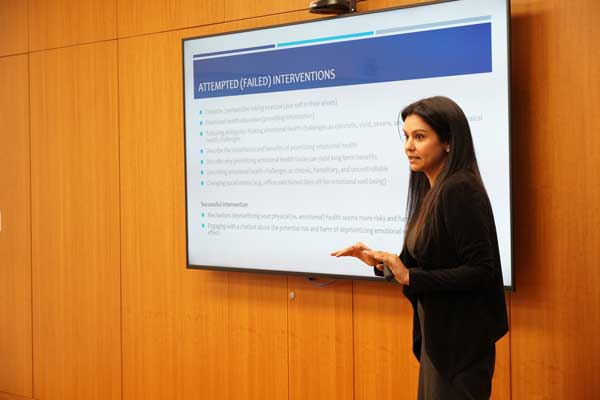Fowler Professors Share Their Research Insights on Financial Literacy and Well-Being
 Open the image full screen.
Open the image full screen.
Academic research surrounding financial literacy and well-being was the presentation topic at a recent faculty colloquium held at SDSU’s Fowler College of Business.
The colloquium, titled “Financial Literacy, Financial Decision-Making, and Wellness,” featured marketing professor Eesha Sharma and finance professors Ning Tang and Byeong-Je An leading a discussion about how consumers’ finances and their financial education impacts spending, saving and management among consumers and investors.
Sharma shared how her research indicated that consumers’ perceptions of their finances play heavily in their consumption and financial decisions. For example, her research suggests that while consumers may be more likely to make purchases when they feel financially constrained (“retail therapy”), they are less satisfied with those purchases. However, planning purchases more carefully reduces the negative effect of financial constraints on purchase satisfaction.
“In comparing the purchasing decisions of those who feel poor compared to those who do not, we found that those who perceived themselves to be financially strapped do not necessarily make rash or shortsighted decisions any more often than those who don’t, depending on the timing of their threatened needs,” said Sharma. “Our research is consistent with the theory that those who feel poor attempt to make the best decisions they can, given their circumstances.”
It is the information available to consumers that formed the basis of Tang’s presentation. In a summary of previous research, Tang noted that financial information based on previous experience, lessons learned in school and parental influence led to an individual’s financial knowledge and behavior and that financial awareness (money management attitude) generally leads to greater financial outcomes (money management success).
 Open the image full screen.
Open the image full screen.“Interestingly, research seems to conclude that the least knowledgeable investors do not seek professional financial advice most as expected,” she said. “This may be due to a lack of trust in the quality of financial advice or overconfidence in their investment abilities.”
Tang is currently working on two studies to better understand the correlation between financial planning education and financial literacy among teens and young adults. In the first study, Tang is part of the Girls Invest program, a National Institute of Health-funded project that is researching the impact of financial literacy on economic independence and the rate of pregnancy among teenage girls in the underserved community of National City, California. She is also a member of a team that is investigating how access to a specific financial planning mobile app affects the ability of 1,000 first-year business students to manage debt and budgets, which in turn determine their long-term academic and financial success.
While Tang’s studies focus on those about to begin their careers, An’s research examines the expectations of those who are about to retire.
“My research examined how people form beliefs about their planned retirement date and how these beliefs correlate with their actual retirement date,” said An. “We found that most individuals in our survey retired about two years later than expected and we studied some of the factors that lead to retirement delays.”
One of An’s key findings is that people tend to underestimate their lifespan which causes them to plan for retirement earlier than when they actually stopped working.
 Open the image full screen.
Open the image full screen.
“This two-year delay can be expensive,” said An. “Because people base their saving and spending decisions on an earlier retirement date, the mismatch adds up over time leading to an average shortfall of $22,000 in retirement savings.”
In a follow-up to this study, An and Tang are collaborating on research focusing on economic outlook beliefs, specifically on how an individual’s outlook on the economy five years into the future (better, same, worse) drives financial behaviors. They are also studying how a better understanding of economic policy can mitigate costly investment errors.

